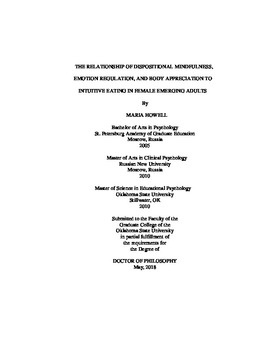| dc.contributor.advisor | Montgomery, Diane | |
| dc.contributor.author | Howell, Maria | |
| dc.date.accessioned | 2019-03-25T21:59:38Z | |
| dc.date.available | 2019-03-25T21:59:38Z | |
| dc.date.issued | 2018-05 | |
| dc.identifier.uri | https://hdl.handle.net/11244/317787 | |
| dc.description.abstract | Intuitive eating is an adaptive non-dietary eating behavior associated with multiple beneficial outcomes (Augustus-Horvath & Tylka, 2011; Avalos & Tylka, 2006). Although body appreciation is a confirmed strong predictor of intuitive eating, research is needed to identify other intrapsychological contributors to this adaptive eating behavior. The current study used theories of mindfulness, emotion regulation, and intuitive eating to examine the contribution of dispositional mindfulness, habitual use of emotion regulation strategies, and body appreciation to intuitive eating in a sample of 394 female emerging adult college students (mean age 21 years, SD=1.88). Hierarchical regression analyses were conducted to test the study hypotheses. Body Mass Index (BMI) was used as a confounding variable in all regression analyses. Findings indicated that similar to the acceptance model of intuitive eating, body appreciation was the strongest contributor to the variance in intuitive eating. Unidimensional mindfulness accounted for a unique variance in intuitive eating over and above the contribution of body appreciation and emotion regulation strategies. As a set, emotion regulation strategies also emerged as a significant predictor of intuitive eating after accounting the variance explained by body appreciation and dispositional mindfulness. Only four facets of dispositional mindfulness including non-judging, non-reactivity, describing, and observing significantly contributed to intuitive eating. Finally, data supported the conceptual model of intuitive eating, where BMI was the most distal contributor to intuitive eating and body appreciation was its most proximal contributor. Based on the primary hierarchical regression analysis, post hoc bootstrapping mediation analysis were conducted. Mediation analysis revealed that the acting with awareness mindfulness facet exerted a medium in magnitude indirect effect on intuitive eating through the non-judging mindfulness facet. Similarly, post hoc mediation analyses examining the mediating role of body appreciation found that dispositional mindfulness and adaptive and maladaptive emotion regulation strategies had a significant medium in magnitude indirect effect on intuitive eating through body appreciation. Additionally, unidimensional mindfulness and maladaptive emotion regulation strategies had a direct effect on intuitive eating. Regardless of its limitations, the results of this study have implications for clinical practice, prevention, mindfulness and intuitive eating theory, and future research. | |
| dc.format | application/pdf | |
| dc.language | en_US | |
| dc.rights | Copyright is held by the author who has granted the Oklahoma State University Library the non-exclusive right to share this material in its institutional repository. Contact Digital Library Services at lib-dls@okstate.edu or 405-744-9161 for the permission policy on the use, reproduction or distribution of this material. | |
| dc.title | Relationship of dispositional mindfulness, emotion regulation, and body appreciation to intuitive eating in female emerging adults | |
| dc.contributor.committeeMember | Crethar, Hugh | |
| dc.contributor.committeeMember | Jacobs, Sue | |
| dc.contributor.committeeMember | Hubach, Randolph | |
| dc.contributor.committeeMember | Grant, DeMond | |
| osu.filename | Howell_okstate_0664D_15784.pdf | |
| osu.accesstype | Open Access | |
| dc.type.genre | Dissertation | |
| dc.type.material | Text | |
| thesis.degree.discipline | Counseling Psychology | |
| thesis.degree.grantor | Oklahoma State University | |
